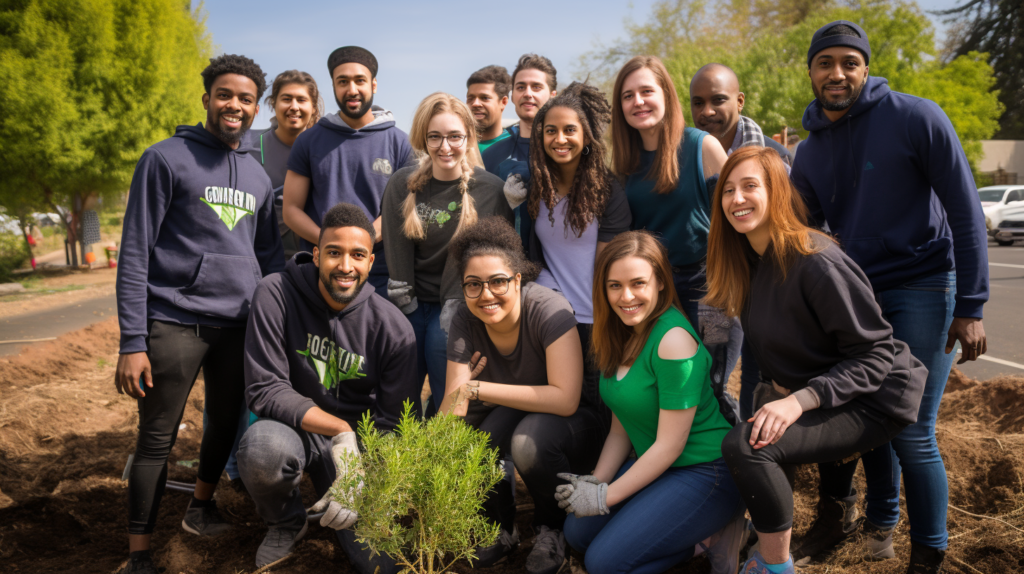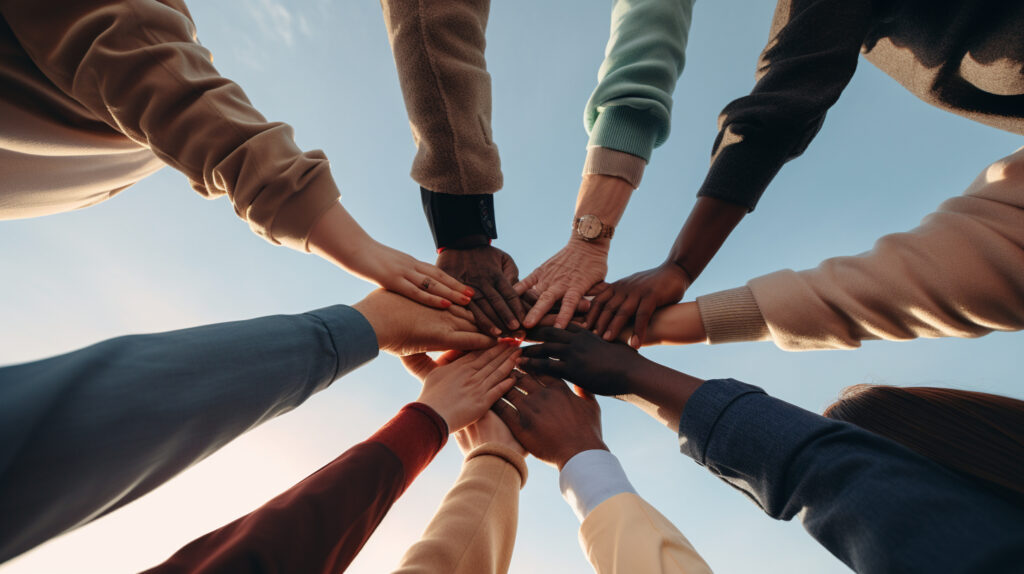Hey there! Are you passionate about social justice and making a difference in your local community? Well, you’ve come to the right place! In this article, we’re going to explore the ways in which you can support social justice causes and contribute to positive change right where you live.
Social justice is an incredibly important issue that affects people from all walks of life. It’s about ensuring that everyone has equal rights, opportunities, and resources, regardless of their race, gender, socioeconomic status, or any other factor. By promoting social justice, we strive to create a fair and inclusive society where everyone can thrive.
Now, you might be wondering how you can actively support social justice causes in your community. What can you do as an individual? Well, I’m here to tell you that you can make a difference, no matter how big or small your actions may seem. From raising awareness to collaborating with local organizations, there are plenty of ways for you to get involved and contribute to the cause.
So, let’s dive in and explore the different ways we can support social justice and work towards building a more equitable and inclusive society. It’s time to roll up our sleeves and make our communities a better place for everyone. Are you ready? Let’s go!

Understanding Social Justice
In order to make a difference in our local communities, it’s important to have a clear understanding of what social justice means and why it’s significant. Let’s dive into the definition of social justice and explore its historical context.
Definition and Importance
Social justice refers to the fair and equitable distribution of resources, opportunities, and privileges in society. It aims to address and rectify systemic inequalities based on factors such as race, gender, socioeconomic status, and more. The goal is to ensure that every individual has equal access to basic human rights and opportunities for personal and societal growth.
Social justice is crucial because it promotes a society that is fair, inclusive, and just. It requires recognizing and challenging existing power structures that perpetuate discrimination and marginalization. By addressing these systemic issues, we can work towards building a society where everyone has the chance to thrive and reach their full potential.
Historical Context
To fully comprehend social justice, it is essential to understand its historical context. Throughout history, various social justice movements have emerged to challenge oppression and inequality. Some significant movements include:
- Civil Rights Movement: Fought for racial equality and an end to segregation in the United States, led by figures such as Martin Luther King Jr. and Rosa Parks.
- Feminist Movement: Advocated for gender equality and women’s rights, targeting issues such as voting rights, reproductive rights, and equal pay.
- LGBTQ+ Rights Movement: Strived for equal rights and protection for lesbian, gay, bisexual, transgender, and queer individuals, including marriage equality and anti-discrimination laws.
- Environmental Justice Movement: Addresses the disproportionate impact of environmental harm on marginalized communities, advocating for sustainable practices and equitable distribution of resources.
These movements, among others, have shaped the understanding and pursuit of social justice today. By learning from the past, we can better address current social justice issues in our local communities.
“Social justice cannot be attained by violence. Violence kills what it intends to create.” – Pope John Paul II
Remember, social justice is about promoting positive change in a peaceful and inclusive way.
Identifying Social Justice Issues in Local Communities
When it comes to fighting for social justice, the first step is to identify the issues that need attention in your local community. By understanding and addressing these issues, you can begin to make a meaningful difference in the lives of those affected. Here are some effective ways to identify social justice issues in your local community:
Researching Local Issues
Start by doing some research on the key social justice issues that are prevalent in your community. This can involve reading local news articles, reports from community organizations, and government documents. Look for patterns and recurring themes that indicate areas of concern. Some common social justice issues include:
- Racial inequality: Look for statistics on racial disparities within areas such as education, employment, housing, and criminal justice.
- Gender inequality: Research issues related to unequal pay, limited job opportunities, and unequal representation in positions of power.
- LGBTQ+ rights: Examine local laws and policies that support or hinder LGBTQ+ rights, and look for gaps in protections.
- Poverty and economic inequality: Investigate the poverty rates in your community and the availability of resources for those in need.
- Environmental justice: Explore how environmental issues, such as pollution or lack of access to clean water, disproportionately affect marginalized communities.
Listening to Marginalized Voices
It’s crucial to actively listen to the voices of marginalized individuals and communities in order to understand their unique experiences and perspectives. By listening to their stories and challenges, you can gain a deeper understanding of the social justice issues that need attention. Here are some ways to listen to marginalized voices:
- Community forums and meetings: Attend local community events, town hall meetings, or forums where people can openly discuss social justice issues that affect them.
- Engage with community leaders: Seek out individuals who have a deep understanding of local issues and engage in conversations with them.
- Form relationships with community organizations: Connect with local organizations that support marginalized communities and learn from their experiences and expertise.
- Online platforms and social media: Follow social justice activists and organizations on social media platforms to learn about their work and the issues they are addressing.
By actively listening and engaging with marginalized voices, you can gain a better understanding of the social justice issues that are affecting your local community. This knowledge will help you develop effective strategies and advocate for positive change. Remember, the most effective solutions often come from those directly impacted by the issues.
“Listening is the beginning of understanding. Understanding is the beginning of change.” – Unknown
Effective Strategies for Social Justice Advocacy
Advocating for social justice can be a powerful way to make a difference in your local community. It involves taking action to address systemic inequalities and promote fairness and equality for all. While it may seem daunting, there are effective strategies you can employ to advocate for social justice. Here are some key strategies to consider:
Raising Awareness
One of the first steps in advocacy is raising awareness about the social justice issues that are important to you. This can involve educating others about the causes, consequences, and solutions to these issues. Some effective ways to raise awareness include:
- Social media campaigns: Utilize platforms like Facebook, Twitter, and Instagram to share information, stories, and resources related to social justice issues. Create engaging and shareable content to spread awareness to a wider audience.
- Community events: Organize or participate in community events such as workshops, panel discussions, or town hall meetings. Invite speakers or experts to talk about specific social justice issues and encourage dialogue and discussion.
- Writing and storytelling: Write articles, blog posts, or op-eds to share your personal experiences or research on social justice issues. Submit these pieces to local newspapers or online platforms to reach a larger audience.
Educating Others
Building a knowledgeable and informed community is a crucial aspect of social justice advocacy. By educating others about the root causes and impacts of social injustice, you can empower individuals to take action and make a difference. Here are some ways you can educate others:
- Workshops and training sessions: Organize educational workshops or training sessions on topics related to social justice. Cover subjects such as unconscious bias, privilege, and systemic oppression. Encourage participation and discussion to deepen understanding.
- Partnerships with educational institutions: Collaborate with schools, colleges, or universities to develop programs or courses that focus on social justice issues. Engage students in discussions and provide resources to help them understand and address these issues.
- Media literacy: Promote media literacy and critical thinking skills to help individuals analyze and deconstruct biased or oppressive narratives in media. Encourage conversations about media representation and its impact on marginalized communities.
Engaging in Peaceful Protests
Peaceful protests have historically been an effective means of advocating for social justice. They draw attention to issues and exert pressure on policymakers and institutions to take action. If you’re considering participating in a protest, here are a few things to keep in mind:
- Know the cause: Familiarize yourself with the cause and understand the specific issues being addressed. This will help you articulate your stance and engage in meaningful conversations with others.
- Research the event: Before attending a protest, conduct research to ensure it aligns with nonviolent principles and has clear goals and demands. Avoid events that promote hate or violence.
- Safety precautions: Take necessary safety precautions when participating in protests. Familiarize yourself with local laws and regulations, and consider attending with a group or a buddy for added security.
Remember, advocacy is not limited to a single strategy. You can combine different approaches to maximize your impact. Each strategy has its own strengths and can contribute to creating a more just and equitable society. Whatever strategy you choose, ensuring that your actions are consistent with the values of inclusivity, respect, and nonviolence is essential.
As social justice advocates, we have the power to amplify the voices of the marginalized, drive meaningful change, and build a more equitable future for all. By employing these effective strategies, we can make a significant impact in our local communities and beyond. So, let’s come together and stand up for social justice!
Supporting Local Organizations and Initiatives
Supporting local organizations and initiatives is a powerful way to contribute to social justice in your community. These organizations often work tirelessly to address and resolve social issues, uplift marginalized communities, and promote equality and inclusivity. By getting involved and supporting these initiatives, you can make a meaningful difference in the lives of those who need it the most. Here are some effective ways to support local organizations and initiatives:
Researching Local Nonprofits and Charities
Start by doing some research to identify local nonprofits and charities that focus on social justice issues. Look for organizations that align with your values and areas of interest. Check their mission statements, projects they are involved in, and the impact they have made in the community. Here are a few useful steps to guide your research:
- Online Resources: Utilize online directories and platforms like Charity Navigator, GuideStar, or local community websites to find a list of relevant organizations in your area.
- Word of Mouth: Ask friends, family, and colleagues if they know of any local organizations that work towards social justice. Personal recommendations can often lead you to hidden gems.
- Community Events: Attend community events, fundraisers, or social justice forums to connect with other like-minded individuals and discover local organizations firsthand.
Volunteering and Donations
Once you have identified organizations that resonate with you, there are several ways you can actively support their work:
- Volunteer your Time: Many organizations rely heavily on volunteers to carry out their programs. Find out how you can get involved by offering your time, skills, or expertise. Whether it’s mentoring, tutoring, event assistance, or administrative support, your contribution can make a significant impact.
- Make Financial Donations: Financial contributions are essential for organizations to sustain their operations and expand their reach. Consider making regular donations, no matter how small, to support their ongoing work. You can also explore workplace giving programs or participate in fundraising campaigns to maximize your impact.
- In-Kind Donations: Apart from monetary support, organizations often have specific needs for goods or services. These can range from clothing and food items to professional services like legal advice or graphic design assistance. Find out what items or services are needed and contribute accordingly.
Partnership and Collaboration
Another effective way to support local organizations and initiatives is through partnership and collaboration. By working together, you can leverage your skills, resources, and networks to enhance the impact of social justice efforts. Here’s how you can collaborate:
- Business Sponsorship: If you own or work for a business, consider sponsoring local organizations or initiatives. This could involve providing financial support, offering in-kind services, or running joint promotional campaigns. By aligning your business with social justice causes, you not only create positive change but also enhance your brand’s reputation.
- Networking and Advocacy: Connect with individuals and organizations in your community who share similar goals. Attend networking events, workshops, or panel discussions to broaden your understanding of social justice issues and build strategic alliances. By joining forces, you can amplify your collective voice and advocate for change.
- Mutual Learning and Support: Engage in dialogues and learning exchanges with local organizations to understand their needs, challenges, and successes. Offer your support by sharing knowledge, resources, or expertise that could benefit their initiatives. Engaging in mutual learning fosters long-term relationships and strengthens the social justice ecosystem in your community.
By supporting local organizations and initiatives, you play a crucial role in driving social change. Your contributions, whether through volunteering, donations, collaboration, or advocacy, can have ripple effects that positively impact the lives of individuals and communities. Remember, even small acts of support can create significant opportunities for vulnerable populations and contribute to a more just and inclusive society. So roll up your sleeves, get involved, and be a catalyst for positive change in your community.
Creating Lasting Change through Policy and Governance
In order to create long-term and impactful change in our local communities, it is crucial to engage with policy and governance. This means working alongside local government officials and advocating for policy changes that promote social justice. By addressing issues directly at the systemic level, we can create a lasting impact that will benefit marginalized communities for years to come. Below are some effective strategies for creating change through policy and governance:
Collaborating with Local Government
- Research existing policies: Start by understanding the current policies in your community that may perpetuate social injustices. Identify areas where reform is needed.
- Build relationships: Establish connections with local government officials such as city council members and county commissioners. Attend community meetings and engage in open dialogues to share your concerns and suggestions.
- Participate in public hearings: Public hearings are opportunities for community members to voice their opinions on proposed policies. Take advantage of these forums to express your support for inclusive policies and advocate against discriminatory ones.
- Form coalitions and alliances: Join forces with other organizations and activists who share your commitment to social justice. Collaborate on campaigns and initiatives to amplify your collective voice and influence local decision-making processes.
Advocating for Policy Changes
- Engage in grassroots advocacy: Mobilize your community and organize campaigns to raise awareness about the need for policy changes. Utilize social media, petitions, and public events to garner support.
- Write letters and make phone calls: Reach out to elected officials, expressing your concerns and advocating for specific policy changes. Personalize your messages to ensure they resonate with decision-makers.
- Support legislation: Stay informed about proposed legislation that aligns with your values of social justice. Write letters of support, testify at hearings, and encourage community members to rally behind these initiatives.
- Leverage the media: Utilize local media outlets to amplify your message and garner public support. Submit op-eds and press releases, or organize press conferences to draw attention to your cause.
- Be persistent: Change takes time and persistence. Continue to engage with local government officials, track progress, and hold them accountable for their promises. Don’t be afraid to push for more when progress is slow or stagnant.
Creating change through policy and governance requires patience, perseverance, and collaboration. By actively participating in the political process, we can ensure that our communities are governed in a way that promotes equality, justice, and social inclusion. Remember, change starts at the grassroots level, so don’t underestimate the power of your voice and your actions. Let’s work together to create a future where social justice is the norm rather than the exception.
“Change will not come if we wait for some other person or some other time. We are the ones we’ve been waiting for. We are the change that we seek.” – Barack Obama
Promoting Diversity and Inclusion in the Community
In a diverse and multicultural world, promoting diversity and inclusion is essential for building strong and vibrant communities. By embracing different cultures, backgrounds, and perspectives, we create a more inclusive society where everyone feels valued and appreciated. In this section, we will explore some effective strategies for promoting diversity and inclusion in your local community.
Encouraging Equal Opportunities
One way to promote diversity and inclusion is by advocating for equal opportunities for all individuals, regardless of their race, gender, sexual orientation, or ability. Here are some ways you can encourage equal opportunities in your community:
- Support Local Businesses: Seek out and support local businesses owned by individuals from underrepresented communities. By doing so, you contribute to the economic growth and empowerment of marginalized groups.
- Organize Diversity Workshops: Collaborate with local organizations or community centers to host workshops that promote diversity and educate people on the importance of inclusion. These workshops can cover topics such as unconscious bias, cultural sensitivity, and creating an inclusive environment.
- Promote Inclusive Hiring Practices: Advocate for businesses and organizations in your community to implement inclusive hiring practices. Encourage diversity in their recruitment processes and emphasize the benefits of a diverse workforce.
Celebrating Cultural Diversity
Another effective way to promote diversity and inclusion in your community is by celebrating the cultural diversity that exists within it. This can help foster understanding, respect, and appreciation for different cultures. Here are some ideas to celebrate cultural diversity:
- Organize Cultural Events: Collaborate with local groups and organizations to host cultural events that showcase music, dance, art, and cuisines from different cultures. This will allow residents to learn about and experience diverse traditions and practices.
- Create Community Dialogue Spaces: Establish spaces where community members can come together to have open and respectful discussions about cultural diversity. These safe spaces provide an opportunity to share experiences, address misconceptions, and build connections.
- Promote Cultural Exchange Programs: Encourage your community to participate in cultural exchange programs that allow individuals to learn from and engage with different cultures. This can be done through partnerships with schools, universities, or local cultural organizations.
By actively promoting diversity and inclusion in your community, you create a welcoming and accepting environment for everyone. Remember that change starts at the local level, and your efforts can make a significant impact on fostering a more inclusive society.
“Diversity is not about how we differ. Diversity is about embracing one another’s uniqueness.” – Ola Joseph
Educating Future Generations about Social Justice
As society progresses, it is important to think about how we can educate future generations about social justice. By instilling a sense of empathy, understanding, and awareness in the youth, we can create a better and more equal society for all. Here are some effective ways to educate future generations about social justice:
School Programs and Curriculum
Schools play a crucial role in shaping the minds of young individuals. Integrating social justice education into the school programs and curriculum can help raise awareness and create a more inclusive learning environment. Here are a few ideas on how this can be accomplished:
- Incorporate social justice topics: Include social justice issues, such as racism, gender equality, and environmental justice, in various subjects like history, literature, and social studies. By examining these topics in an academic setting, students can develop a deeper understanding of their social implications.
- Guest speakers and workshops: Invite guest speakers, activists, and community leaders to conduct workshops or give talks on social justice topics. This can provide students with real-life experiences, personal stories, and practical knowledge.
- Service-learning projects: Engage students in service-learning projects that address social justice issues in their local communities. This hands-on experience allows them to actively participate in making a difference while learning about the challenges faced by marginalized populations.
Youth Empowerment Initiatives
Empowering young individuals to become advocates for social justice is essential for creating lasting change. Here are some initiatives that can help empower and inspire the youth:
- Youth-led organizations: Encourage the establishment of youth-led organizations that focus on social justice issues. These organizations can provide a platform for young individuals to voice their concerns, take action, and collaborate with like-minded peers.
- Leadership training programs: Offer leadership training programs that specifically address social justice advocacy. These programs can equip young individuals with the necessary skills to effectively advocate for change, including public speaking, critical thinking, and community organizing.
- Mentorship programs: Pair young individuals with mentors who are experienced in social justice work. This mentorship can provide guidance, support, and valuable insights into the field of social justice advocacy.
In educating future generations about social justice, it is crucial to create a safe and inclusive environment that encourages open dialogue, critical thinking, and empathy. By incorporating social justice topics into school curriculum, providing platforms for youth involvement, and fostering a culture of mentorship and empowerment, we can help shape a more just and equitable society for generations to come.
“Education is the passport to the future, for tomorrow belongs to those who prepare for it today.” – Malcolm X
Conclusion
Conclusion
In conclusion, supporting social justice is an essential endeavor that can make a significant difference in local communities. By understanding social justice issues, implementing effective advocacy strategies, supporting local organizations and initiatives, and promoting diversity and inclusion, we can create lasting change and empower marginalized communities. Furthermore, educating future generations about social justice ensures that this crucial work continues in the future.
At A Broader View Volunteers, we are committed to promoting social justice and empowering local communities worldwide. Our volunteer programs focus on addressing social issues, fostering cultural exchange, and creating sustainable projects. Through our meaningful and life-changing experiences, you can actively contribute to supporting social justice causes while gaining a deeper understanding of global issues.
Join us in making a difference today! Visit our website at www.abroaderview.org to learn more about our volunteer opportunities and how you can get involved. Together, we can create a more just and equitable world for all.
Remember, supporting social justice is not only about making a difference in the lives of others; it also enriches your own life and widens your horizons. By embracing social justice values, we can build stronger communities that celebrate diversity, uphold equality, and work towards a better future for all.
Frequently Asked Questions
- What is social justice?Social justice is the concept of fair and equal distribution of resources, rights, and opportunities in society, aiming to create a more inclusive and equitable community.
- Why is supporting social justice important?Supporting social justice is crucial because it helps address systemic inequalities, promotes equal rights, empowers marginalized communities, and fosters a more just and progressive society.
- How can I make a difference in local communities?You can make a difference in local communities by volunteering with local organizations, supporting minority-owned businesses, engaging in community conversations, advocating for inclusive policies, and educating yourself and others about social justice issues.
- What are some examples of social justice initiatives in local communities?Some examples of social justice initiatives in local communities include food drives, homeless shelters, mentorship programs, educational initiatives, diversity and inclusion workshops, and advocacy campaigns for equal rights and opportunities.
- How can individuals contribute to social justice efforts?Individuals can contribute to social justice efforts by donating to nonprofits, participating in protests and demonstrations, holding elected officials accountable, supporting grassroots movements, and challenging discriminatory behavior and attitudes in their own lives.



